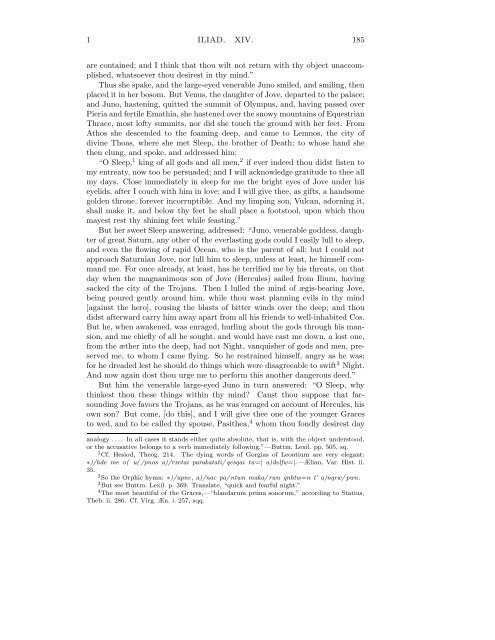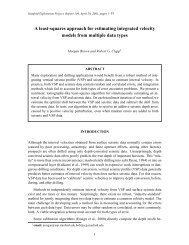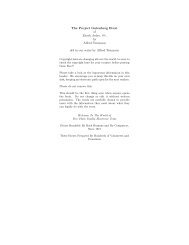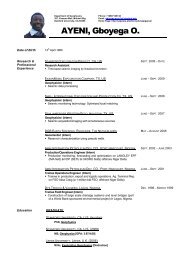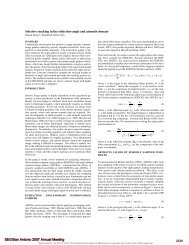The Project Gutenberg Etext of the Iliad of - Stanford Exploration ...
The Project Gutenberg Etext of the Iliad of - Stanford Exploration ...
The Project Gutenberg Etext of the Iliad of - Stanford Exploration ...
You also want an ePaper? Increase the reach of your titles
YUMPU automatically turns print PDFs into web optimized ePapers that Google loves.
1 ILIAD. XIV. 185<br />
are contained; and I think that thou wilt not return with thy object unaccomplished,<br />
whatsoever thou desirest in thy mind.”<br />
Thus she spake, and <strong>the</strong> large-eyed venerable Juno smiled, and smiling, <strong>the</strong>n<br />
placed it in her bosom. But Venus, <strong>the</strong> daughter <strong>of</strong> Jove, departed to <strong>the</strong> palace;<br />
and Juno, hastening, quitted <strong>the</strong> summit <strong>of</strong> Olympus, and, having passed over<br />
Pieria and fertile Emathia, she hastened over <strong>the</strong> snowy mountains <strong>of</strong> Equestrian<br />
Thrace, most l<strong>of</strong>ty summits, nor did she touch <strong>the</strong> ground with her feet. From<br />
Athos she descended to <strong>the</strong> foaming deep, and came to Lemnos, <strong>the</strong> city <strong>of</strong><br />
divine Thoas, where she met Sleep, <strong>the</strong> bro<strong>the</strong>r <strong>of</strong> Death; to whose hand she<br />
<strong>the</strong>n clung, and spoke, and addressed him:<br />
“O Sleep, 1 king <strong>of</strong> all gods and all men, 2 if ever indeed thou didst listen to<br />
my entreaty, now too be persuaded; and I will acknowledge gratitude to <strong>the</strong>e all<br />
my days. Close immediately in sleep for me <strong>the</strong> bright eyes <strong>of</strong> Jove under his<br />
eyelids, after I couch with him in love; and I will give <strong>the</strong>e, as gifts, a handsome<br />
golden throne, forever incorruptible. And my limping son, Vulcan, adorning it,<br />
shall make it, and below thy feet he shall place a footstool, upon which thou<br />
mayest rest thy shining feet while feasting.”<br />
But her sweet Sleep answering, addressed: “Juno, venerable goddess, daughter<br />
<strong>of</strong> great Saturn, any o<strong>the</strong>r <strong>of</strong> <strong>the</strong> everlasting gods could I easily lull to sleep,<br />
and even <strong>the</strong> flowing <strong>of</strong> rapid Ocean, who is <strong>the</strong> parent <strong>of</strong> all; but I could not<br />
approach Saturnian Jove, nor lull him to sleep, unless at least, he himself command<br />
me. For once already, at least, has he terrified me by his threats, on that<br />
day when <strong>the</strong> magnanimous son <strong>of</strong> Jove (Hercules) sailed from Ilium, having<br />
sacked <strong>the</strong> city <strong>of</strong> <strong>the</strong> Trojans. <strong>The</strong>n I lulled <strong>the</strong> mind <strong>of</strong> ægis-bearing Jove,<br />
being poured gently around him, while thou wast planning evils in thy mind<br />
[against <strong>the</strong> hero], rousing <strong>the</strong> blasts <strong>of</strong> bitter winds over <strong>the</strong> deep; and thou<br />
didst afterward carry him away apart from all his friends to well-inhabited Cos.<br />
But he, when awakened, was enraged, hurling about <strong>the</strong> gods through his mansion,<br />
and me chiefly <strong>of</strong> all he sought, and would have cast me down, a lost one,<br />
from <strong>the</strong> æ<strong>the</strong>r into <strong>the</strong> deep, had not Night, vanquisher <strong>of</strong> gods and men, preserved<br />
me, to whom I came flying. So he restrained himself, angry as he was;<br />
for he dreaded lest he should do things which were disagreeable to swift 3 Night.<br />
And now again dost thou urge me to perform this ano<strong>the</strong>r dangerous deed.”<br />
But him <strong>the</strong> venerable large-eyed Juno in turn answered: “O Sleep, why<br />
thinkest thou <strong>the</strong>se things within thy mind? Canst thou suppose that farsounding<br />
Jove favors <strong>the</strong> Trojans, as he was enraged on account <strong>of</strong> Hercules, his<br />
own son? But come, [do this], and I will give <strong>the</strong>e one <strong>of</strong> <strong>the</strong> younger Graces<br />
to wed, and to be called thy spouse, Pasi<strong>the</strong>a, 4 whom thou fondly desirest day<br />
analogy .... In all cases it stands ei<strong>the</strong>r quite absolute, that is, with <strong>the</strong> object understood,<br />
or <strong>the</strong> accusative belongs to a verb immediately following.”—Buttm. Lexil. pp. 505, sq.<br />
1 Cf. Hesiod, <strong>The</strong>og. 214. <strong>The</strong> dying words <strong>of</strong> Gorgias <strong>of</strong> Leontium are very elegant:<br />
∗)/hde me o( u( /pnos a)/rxetai parakatati/ qesqai tw=| a)delfw=|.—Ælian, Var. Hist. ii.<br />
35. 2So <strong>the</strong> Orphic hymn: ∗)/upne, a)/nac pa/ ntwn maka/ rwn qnhtw=n t’ a)nqrw/ pwn.<br />
3 But see Buttm. Lexil. p. 369. Translate, “quick and fearful night.”<br />
4 <strong>The</strong> most beautiful <strong>of</strong> <strong>the</strong> Graces,—“blandarum prima sonorum,” according to Statius,<br />
<strong>The</strong>b. ii. 286. Cf. Virg. Æn. i. 257, sqq.


